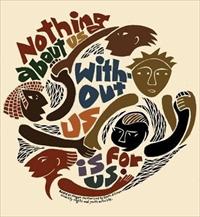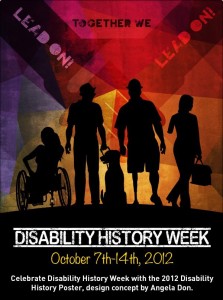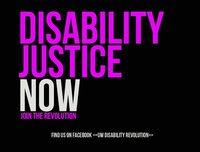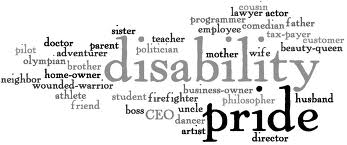How to Be an Ally in Two Easy Steps
You can find a great deal of brilliant writing on the Internet about how to be — and how not to be — an ally. From Mia McKenzie’s 8 Ways Not To Be An “Ally”: A Non-Comprehensive List to Jessie-Lane Metz’s Ally-Phobia: The Worse of Best Intentions to Eli Clare’s Be an Ally to Disabled People to Frances E. Kendall’s How to Be an Ally if You Are a Person with Privilege, the writing on this topic is prolific, and anyone who wants to be an ally has likely stumbled upon it.
But what about all of the people who say, “I can’t think this hard. I’m tired. I just got home from my lousy job, my kid is screaming in my ear, and all I want from life is to fall asleep in front of the TV. And besides, I love everybody and I don’t harbor any bigotry. Good night.” These are the people I desperately want to reach. All the folks who have already made the commitment to be allies? I can refer them to people who have done the work of explaining the issue in painstaking and heartbreaking detail. But the people I want to reach need something a bit more concise to get them started.
So here it is:
How to Be an Ally In Two Easy Steps
1. Listen to and believe the experiences of other people. If someone tells you that they experience racism every day of their lives, believe them. If someone tells you that they are being victimized by disability hatred, believe them. If someone tells you that every bone in their body hurts because of the level of fear and anger they live with as a gay, lesbian, bisexual, or transgender person, believe them. Take this principle and apply it across the board: anyone who tells you what happens to them because of the way their bodies look, work, and experience the world, believe them. Believe, believe, believe. Because people aren’t making it up. They’re not spending their time talking about trauma and injustice because they have some sort of deep need to be depressed and angry all the time. They’d like the respect due to them as human beings. Step up. Listen and believe.
2. Respect the emotions of other people. Emotions are fine. Emotions, in fact, are wonderful. Emotions give us information about how to proceed in life. Someone who is the target of daily racism, disability hatred, transantagonism, and any other form of violence is going to be angry, in pain, and experiencing fear and despair. Think about it this way: If the world is kicking you on a daily basis, you have a choice. You can self-abnegate or you can get pissed off. Being pissed off is much healthier. Not only does it protect the psyche, but it’s a signal that something is wrong that needs to be made right.
So remember: The anger of another person is not an attack on you personally. Yes, some people can be wounding, destructive, and cruel when they’re angry, but that’s different from the anger itself. There is a difference between a verbal attack and an expression of anger. Someone saying “You are a fucking waste of space and I wish you would die” is a form of verbal violence different from “Your beliefs are dangerous to me and mine, and I’m pissed, and if you don’t fucking step up, the suffering will just go on endlessly.”
Please hold this distinction close to your heart. It’s vital.
A point of clarification for the uninitiated: Anyone who knows me knows that I don’t put up with attack. I don’t accept verbal violence. Words have living, breathing power to me. They can create or destroy. If someone mocks, berates, or disrespects me, I will push back. I have only one non-negotiable in life, and it’s called respecting my dignity as a person. But it works both ways. If respect is my one non-negotiable for how people treat me, it also has to be my one non-negotiable for how I treat other people. I have to be willing to understand the distinction between an attack on my personhood and words that happen to engender fear and pain in me. If someone else’s anger creates fear and pain in me, that’s not an attack. That’s a challenge to step up and respect the dignity of the other person by acknowledging their feelings and their experiences. There isn’t a person on the planet who doesn’t need that kind of respect. It’s absolutely basic to any form of sustainable change.
In the zone between “Let’s just be nice and pretend that everything is fine” and “Let’s say the most vile things we can think of because the world has already gone to hell” there is a space where the work is happening. We can combine love and respect and anger and pain in this work. So let’s do it.
© 2013 by Rachel Cohen-Rottenberg








3 comments already | Leave your own comment
Jennifer Brunson
1/6/2014 | 12:15 pm Permalink
Good Afternoon Ms. Cohen-Rottenberg,
Happy New Years to you and your family. I hope this email finds you well. I am writing to you on behalf of the Special Needs Law Section of the National Academy of Elder Law Attorneys, Patricia Dudek, the Section Chair would like to include your article, How to be an Ally in Two Easy Steps in the Section Newsletter.
This newsletter will be visible to section members and I am happy to send you a copy once it is published. If you agree to allow us to use your article I will send you the author’s agreement.
If you have any questions please don’t hesitate to contact me. Have a great day and a very Happy New Year.
Rachel Cohen-Rottenberg
1/6/2014 | 8:47 pm Permalink
Jennifer, that would be wonderful. Thank you for asking!
Trackbacks & Pingbacks
[…] How to Be an Ally in Two Easy Steps […]